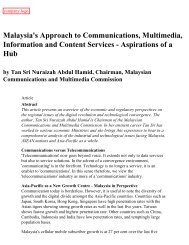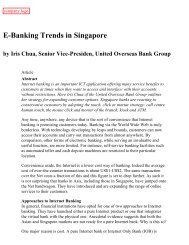Contents - Connect-World
Contents - Connect-World
Contents - Connect-World
You also want an ePaper? Increase the reach of your titles
YUMPU automatically turns print PDFs into web optimized ePapers that Google loves.
Industrial Development<br />
Managed telecommunication services and a vibrant<br />
economy<br />
by Thomas White, Senior Vice-President & General Manager, Communications Solutions Group,<br />
Agilent Technologies<br />
Indias growth as a global economic power depends in large part upon its telecommunication<br />
infrastructure and high quality services. Telecom operators need strategies for effective<br />
network and service management, especially for their highly profitable corporate<br />
accounts. Corporations, though, want guaranteed quality of service. To deliver world-class<br />
services, telecom operators need OSS—operational support systems. Systems that collect,<br />
consolidate, and prioritise information, to present an aggregated, real-time, view of service<br />
quality for targeted customer accounts are essential.<br />
Mr Thomas White is senior vice-president and general manager of Agilent Technologies’ Communications<br />
Solutions Group.<br />
White’s experience in electrical engineering began in Hewlett-Packard Company’s London offices, where he<br />
started as a staff engineer in the Test and Measurement sales office. Since then, Mr White has held numerous<br />
managerial positions in field sales and services as well as in the Manufacturing Divisions in the United<br />
Kingdom, was promoted to general manager of the Telecoms Systems Division (TSD) in Scotland and then<br />
general manager of the Computer Peripherals Bristol Division. Mr White was later appointed vice-president<br />
and general manager of the Communications Solutions Group until his appointment as Agilent’s senior vicepresident<br />
and general manager, Communications Solutions. Mr White is also Country General Manager for<br />
Agilent UK Ltd. White was born in Newark, Nottinghamshire, England. Mr White received his bachelor’s<br />
degree in electrical engineering from Liverpool University.<br />
Telecommunication networks carry<br />
the lifeblood of modern enterprises.<br />
Indias success in becoming a global<br />
economic power will be determined in<br />
large part by the countrys ability to<br />
provide a robust telecommunication<br />
infrastructure with high quality services.<br />
Until recently, telecommunications in<br />
India were a state-run monopoly characterised<br />
by severely limited deployment<br />
and coverage, serving less than<br />
six per cent of the countrys population.<br />
However, the country has been making<br />
great strides to catch up to neighbours<br />
such as China and Malaysia,<br />
whose economies have benefited from<br />
the opening of their markets and by<br />
permitting foreign investment. In<br />
2004, there has been a flurry of activity<br />
in Indias telecommunication sector<br />
as regulatory and policy changes<br />
encourage domestic and foreign<br />
investment, competition among players<br />
intensifies, and the number of subscribers<br />
has grown by double digit<br />
rates. Liberalised licensing rules have<br />
fuelled a boom, particularly in mobile<br />
communications.<br />
The Telecom Regulatory Authority of<br />
India or TRAI (2004), reports that of<br />
the nearly 4 million subscribers added<br />
in July and August 2004, close to 90<br />
per cent were mobile subscribers.<br />
While these changes are exciting and<br />
crucial to the countrys development,<br />
they bring with them the inevitable<br />
headaches that beset telecom operators:<br />
increasingly complex operating<br />
environments, difficult technology<br />
decisions, and relentless competition<br />
that spawns price wars and customer<br />
churn.<br />
Telecom operators, if they are to<br />
remain viable, must quickly find and<br />
nourish a profitable customer base<br />
while providing support for a national<br />
economy on the rise.<br />
Profitable customers are business customersand<br />
business customers<br />
demand high quality services. That<br />
means, in addition to resolving capital<br />
funding and deployment issues, tele-<br />
23
















